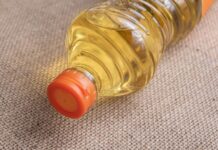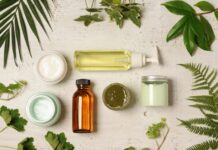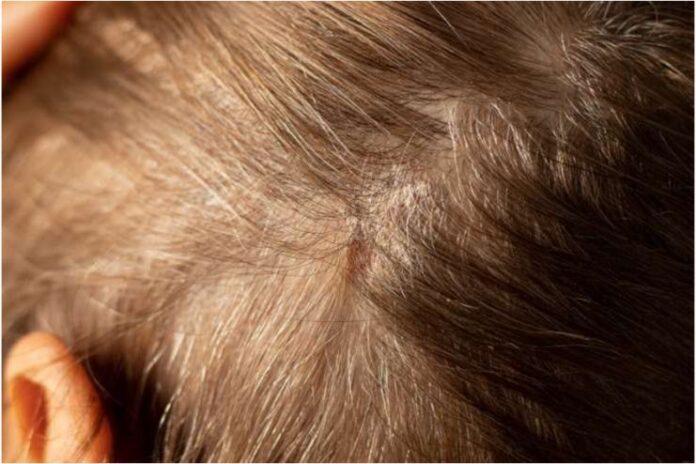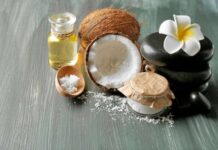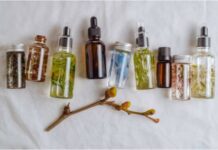AI Contribution
At HealthSpectra, we may use AI to refine grammar and structure, but every piece is shaped, checked, and approved by real people, our expert writers and editors, to ensure clarity, credibility, and care. Learn more..Affiliate Disclaimer
Some links in this article are affiliate links. We may earn a small commission if you make a purchase through these links, at no extra cost to you. We only recommend products we find useful to our readersImagine feeling the scratchy, itching pain of scabs on your scalp as you run your fingers through your hair. Scalp scabs can undermine your confidence and make you self-conscious about how your hair feels and looks, so they’re more than simply physical discomfort. When scalp scabs are frustrating, people often resort to drastic tactics like harsh treatments or constant scratching, worsening the problem.
But what if there was an alternative to an unpleasant or harsh solution? In addition to being gentle on your skin and hair, natural therapies will help you calm your scalp, speed healing, and regain balance.
What are Scabs on Scalp?
Scabs on the scalp are raised yellow crusty patches on the upper layer of the scalp. These scabs may also be dark-colored instead of whitish or yellow; severe scratching or irritation often leads to bleeding.
Scalp scabs may be itchy, irritating, and painful and appear randomly anywhere on the scalp. They may be localized to a single spot or scattered around the scalp. These scabs on the scalp are minor lesions, and their cause can be scratching hair, pulling and picking dandruff, tight braids, and ponytails.
These may not pose any health condition but are painful and displeasing. If left untreated, these scabs on the scalp may result in a foul and unpleasant odor and a displeasing appearance.
Causes Scabs on the Scalp?
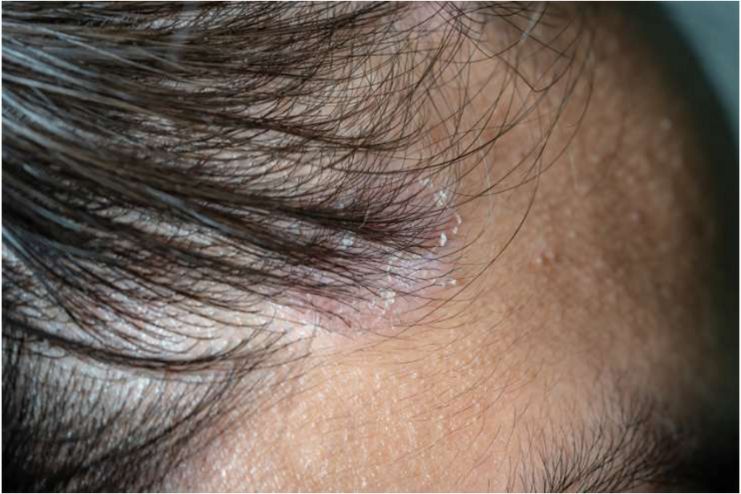
Scalp scabs can arise from various factors, ranging from scalp health issues to underlying physiological conditions many may not recognize. Persistent scratching or picking damages the skin’s outer layer, prompting it to heal by forming crusted tissues known as scabs. These scabs may appear yellow or red. Understanding these triggers is essential for proper treatment and preventing discomfort and further damage.
Dandruff: Dandruff is a widespread problem, and most people are affected by this skin ailment. It tends to make our skin scaly, itchy, and flaky. With severe dandruff comes a yellow or red scaly pimple stuck up at the hairline behind the ears. When pimples mature and break, the skin begins to heal by forming crusty patches. These cause immense itchiness, resulting in scratching and activating scalp scabs.
Psoriasis: The disorder known as psoriasis causes the body to regenerate skin cells far more quickly than usual. It may result from dry, discolored, and scaly skin areas. These patches can appear almost anywhere on the body, including the scalp. Itchy, flaky skin that resembles dandruff might be a symptom of scalp psoriasis. Some people with psoriasis discover that specific items might cause or worsen their symptoms. For example, smoking cigarettes worsens psoriasis and can make it more challenging to eradicate.
Oily Scalp: Oily hair and scalp can be one of the leading causes of scabs in the scalp. Oily secretion causes sores, dandruff, scaly skin, flaky skin, and constant scratching sensations. When your scalp starts secreting excess oil, it tends to make the scalp dirtier faster, causing clogged pores and rashes, which then transform into scabs when drying.
Excess Use of Chemical Hair Dyes: Most people have allergies to these harsh chemical-based hair colors, and soon after applying dye or color, they see scabs on their scalp. When the hair color is used, mild to severe itching results, and with continuous scratching, it gets aggravated. The common ingredient in hair color that causes these severe allergies is para-phenylenediamine.
Presence of lice in the hair: The tiny head lice reside in human hair. The eggs are laid near the hair shaft and survive on small amounts of scalp blood. Over time, these eggs hatch and spread infestations. Children who share brushes and hair products quickly spread head lice. The US has 6–12 million head lice infestations annually. Head lice can itch badly. Sores and scabs from scalp scratching can increase itching. If these sores become infected, a doctor may prescribe antibiotics.
Skin Cancer: Because of direct sun exposure, our bare skin is more prone to possible effects of skin cancer—the scalp being one of them. These tend to cause skin sores and rashes, which are the primary cause of scalp scabs.
Impetigo: Blisters and sores may result from impetigo, a bacterial infection. Usually seen on the mouth and face, the sores can be irritating. But occasionally, they may appear on the hairline or scalp. When Streptococcus or Staphylococcus bacteria get into a cut or wound, impetigo may result. The infection is prevalent in young children and is very contagious.
Home Remedies for Scabs on the Scalp
Home remedies for scabs are one of the most inexpensive and effective ways to heal scalp scabs fast. While over-the-counter remedies can be helpful, it is best to use natural remedies that have little to no side effects.
1. Coconut Oil

Coconut oil contains saturated fats, which are beneficial in treating scalp scabs. It moistens the scalp and helps heal the dry, dead, flaky skin often encountered in scab cases.
It also boosts collagen production (R) in the scalp, which is beneficial for the growth of healthy dermal layers on the scalp and for removing unwanted and dead dermal layers.
What To Do?
- Slightly warm some coconut oil.
- Apply it on your scalp and massage it into the scalp.
- You can even wrap your hand in a warm towel for added benefits.
- Leave it on overnight.
- Wash the oil out with shampoo the following day.
How Often?
Three to four times a week, or even more often if you feel like it.
Get Coconut Oil here
2. Apple Cider Vinegar

Apple cider vinegar has beneficial anti-inflammatory (R) and antimicrobial (R) properties. It also has disinfectant (R) properties, which play a crucial role in getting rid of any form of infection that could be the possible reason behind the scabs on the scalp.
The mild acidic property also helps clean the hair and scalp, thus aiding in treating scalp scabs.
What To Do?
- Mix half a cup of apple cider vinegar with half a cup of water.
- Pour the mixture into a spray bottle.
- While you are in the shower, spray the solution onto your scalp.
- Allow it to sit on your scalp for 5 to 10 minutes.
- Rinse it off with a mild shampoo.
How Often?
Repeat this process twice or thrice a week for noticeable results.
Get Apple Cider Vinegar here
3. Tea Tree Oil
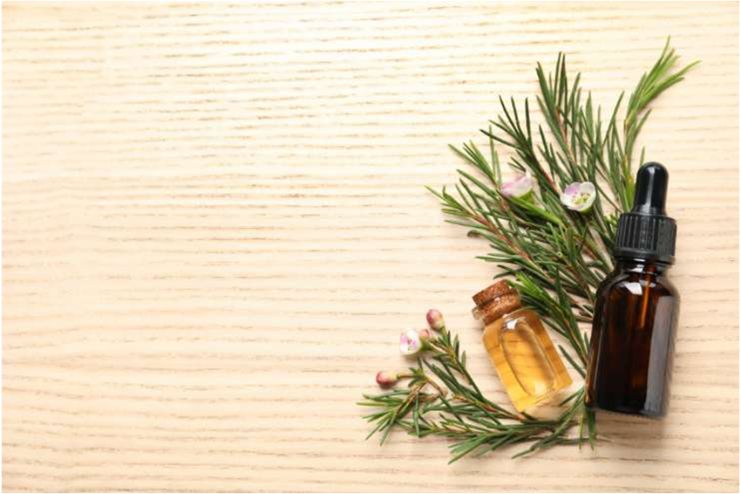
Tea tree oil has antibacterial (R), moisturizing, and healing properties, making it one of the best remedies for scalp scabs. It also possesses antifungal (R) and mild anti-inflammatory properties, which cumulatively work to get rid of scalp scabs.
What To Do?
- Pour a few drops of tea tree oil into a carrier oil of your choice.
- Mix the oils thoroughly.
- Dip a cotton ball into the oil mixture and apply it to the scabs and rashes.
- Gently massage the mixture into the affected areas.
- Leave it on without rinsing.
How Often?
Use at least thrice or four times a week.
Get Tea Tree Oil here
4. Olive Oil

Olive oil contains squalene (R), which has moisturizing and healing benefits for scalp scabs. If you are looking for a home remedy to treat scalp scabs and have healthy and soft hair, olive oil is definitely needed.
What To Do?
- Warm the olive oil for a few seconds
- Apply this on the scalp and massage it into the skin
- Leave it on for the entire night
- Wash it off with a mild and chemical-free shampoo
How Often?
Thrice a week.
Get Oilve Oil here
5. Jojoba Oil
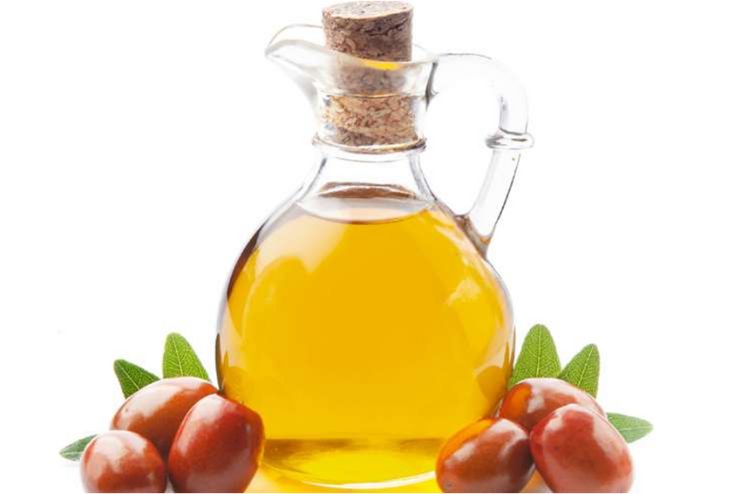
Jojoba oil is a powerful remedy for scalp scabs, as it regulates natural oil production in the scalp. This balance helps treat scabs effectively, promoting healing and long-lasting relief.
What To Do?
- Take a coin-sized amount of jojoba oil in your palm
- Apply it on your scalp, especially on the scabs, and massage it into the skin
- Leave it overnight
- Wash it off the next day with any mild shampoo
How Often?
Thrice a week.
Get Jojoba Oil here
6. Lemon Juice
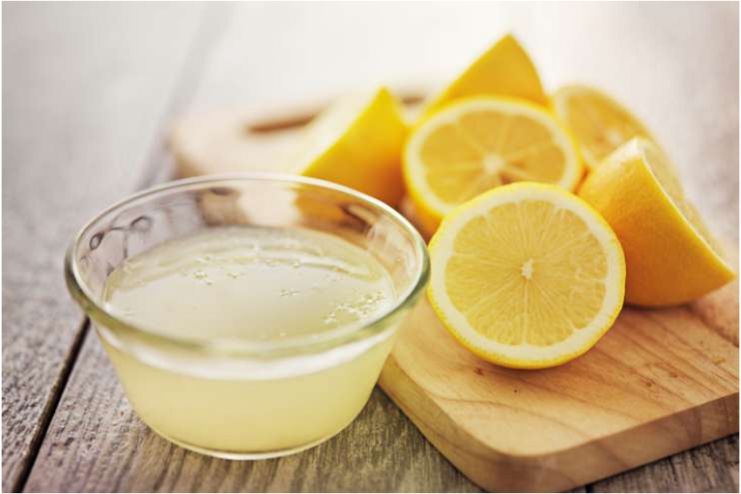
Lemon juice is jam-packed with amazing antioxidants (R) and essential vitamins that help heal the damaged skin on the scalp, which could be the potential reason behind the scalp scab. It is also loaded with amazing antibacterial (R) properties, which help cleanse the pores on the scalp and get rid of any clogged impurities that could be causing the rashes and lesions leading up to the scab.
What To Do?
- Take a lemon and extract the juice out of it.
- Dip a cotton pad or cotton ball in the juice and apply it to the affected area.
- Leave it on for 15 minutes
- Wash it off with lukewarm water
How Often?
Use two to three times daily till the scabs go away.
7. Warm Compress
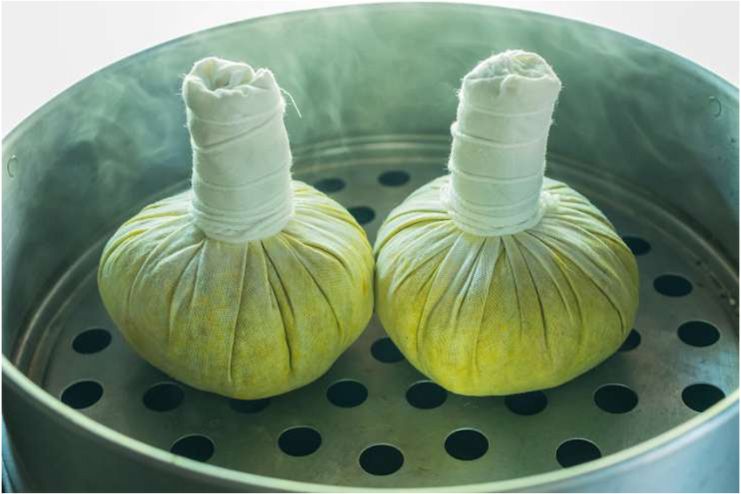
Applying warmth to a scab boosts blood circulation, promoting faster healing. It also softens the scab’s dry, flaky appearance, making it easier to manage. Enhanced blood flow supports the skin’s natural repair process, ensuring the scab heals smoothly and without complications.
What To Do?
- Boil some water in a pan.
- Wet a cloth or compressor with warm water.
- Gently press it over the scabs on the scalp and leave it for 2-3 minutes.
- Repeat this process a few times.
How Often?
Two rounds daily.
8. Warm Oil Massage
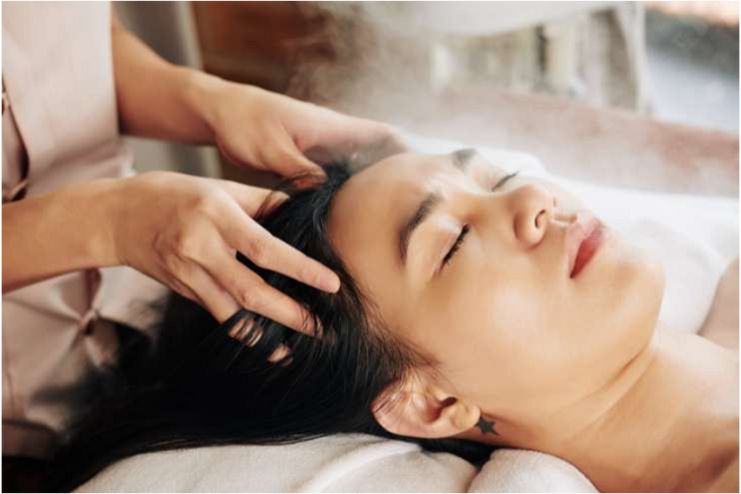
Hair oil massage is a fantastic remedy for treating scalp scabs. The amazing thing about warm hair oil massage for scalp scabs is that it not only moisturizes the scalp but also helps treat the lingering dryness and scaling skin that often tends to affect the area around the scalp.
Massaging also increases blood circulation around the scalp, which is another bonus contributing to the faster healing of the scabs.
What to do?
- Heat some hair oil in a bowl in the microwave for no more than 30 seconds.
- Apply the warm oil to your scalp, focusing on areas prone to scabs, and gently massage it with your fingertips.
- Leave the oil on overnight.
- The next day, wash it out using a mild shampoo.
How Often?
Three to four times a week.
9. Aloe Vera

Aloe vera is known for its beneficial moisturizing, anti-inflammatory, and antioxidant properties, which contribute to treating scalp scabs. While aloe vera’s hydrating and moisturizing properties benefit the healing of dry and dead cells, the antioxidant and antimicrobial properties (R) fight off any infection-inducing microbes on the scalp.
What To Do?
- Cut an aloe vera leaf
- Scoop out the pulp from within it
- Apply this over the scabs on the scalp and leave it on overnight
- Wash it off with a mild shampoo the following day
How Often?
Twice or thrice a week
Get Aloe Vera here
10. Onion juice
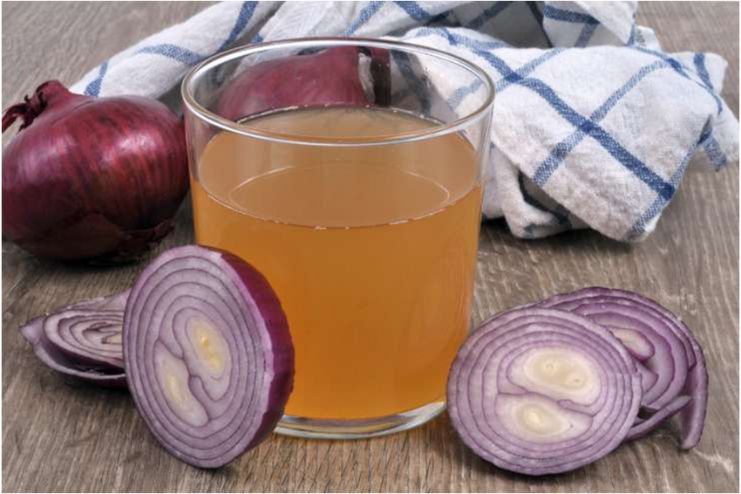
The onion possesses antimicrobial qualities and is abundant in antioxidants. Applying onion juice helps maintain a healthy scalp and prevents the risk of infection. The sulfur in onions nourishes hair follicles and reduces hair loss.
What To Do?
- Peel and grate a fresh onion to extract its juice.
- Apply onion juice directly to your scalp, focusing on areas with scabs.
- Gently massage the juice into the scalp for 5–10 minutes to enhance absorption.
- Leave it on for about 30 minutes.
- Rinse thoroughly with a mild shampoo to remove the onion scent.
How Often?
Use this remedy 2–3 times a week for best results.
11. Neem
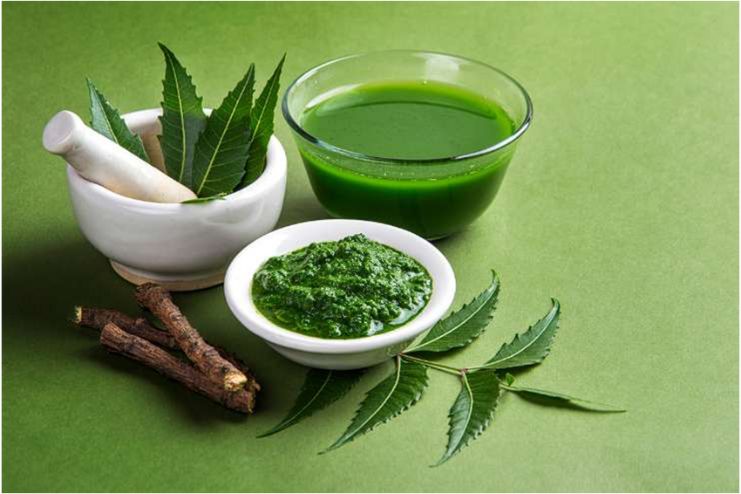
Neem and its beneficial features in treating skin problems are not an unknown fact. The antibacterial (R) and antifungal (R) properties prove fruitful in getting rid of scalp scabs with ease. Not just that, it has good disinfectant properties, which further contribute to preventing any form of infection on the scalp that could further aggravate the situation.
What To Do?
- Boil some water in a pan.
- Add a handful of neem leaves to the pan.
- Boil the leaves in the water for 10-15 minutes to extract the maximum goodness out of it.
- Let the liquid sit for some time till it completely cools down.
- Rinse your hair and scalp with this.
How Often?
Do this daily until you completely heal the scabs.
12. Fish Oil
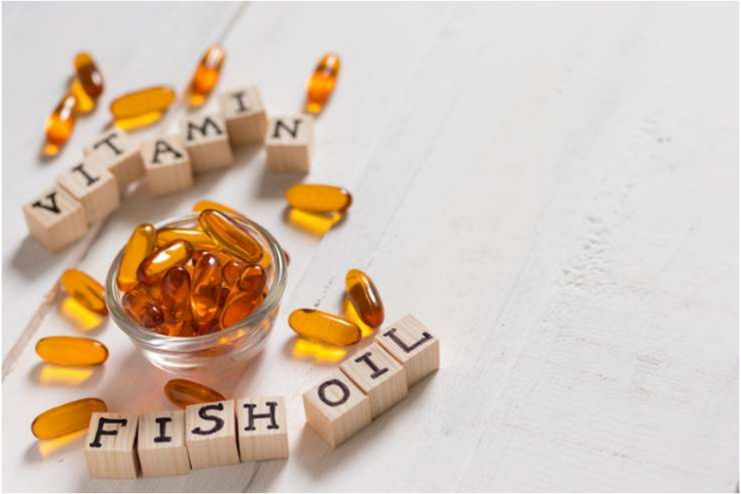
Fish oil is yet another fantastic home remedy for treating scalp scabs. The presence of omega-3 fatty acids is beneficial in treating any kind of skin-related ailment. It heals the skin from within and promotes the generation of healthier skin cells, which are heftily affected by the scabs.
What To Do?
- Mix one fish oil capsule with any carrier oil and mix it well
- Apply it on the scabs and the scalp on the whole and massage it into the scalp
- Leave it overnight
- Wash it o
Get Fish Oil here
13. Tomato Yogurt Mask
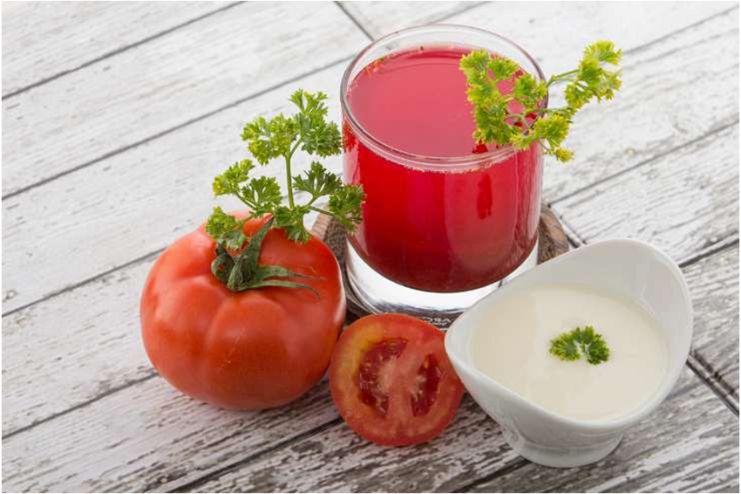
Tomatoes are rich in vitamins and citrus; yogurt is a natural probiotic that helps clear bacteria and viruses. Both help strengthen hair roots and nourish the scalp.
What To Do?
- Blend the two in equal quantities and make a mask.
- Apply this on your scalp and leave for 30 minutes.
- Now wash with lukewarm water.
How Often?
Repeat twice a week to remove scabs on the scalp in a few weeks.
14. Bananas Mashed
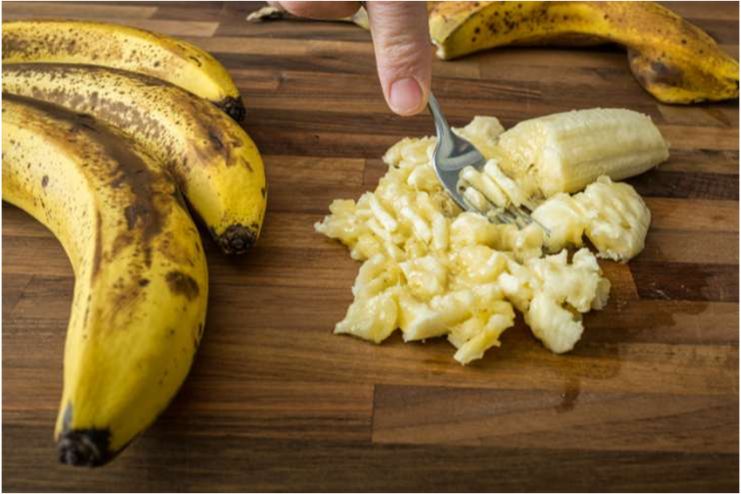
Some studies suggest that bananas’ nutrients could be useful remedies for scalp conditions. According to one study, for instance, bananas’ potassium, oils, and vitamins may help alleviate dandruff, hydrate the scalp, and enhance hair health. Anyone may make their banana hair conditioner at home and try this natural therapy.
What To Do?
- Peel ripe banana and mash it into a smooth paste.
- Apply the mashed banana directly to your scalp, focusing on areas with scabs or dryness.
- Gently massage the banana paste into your scalp for a few minutes to ensure even coverage.
- Leave it on for 20–30 minutes to allow the nutrients to absorb.
- Rinse thoroughly with lukewarm water and follow with mild shampoo if necessary.
How Often?
Use this remedy once a week to nourish and hydrate your scalp.
How Long Does it Take Scalp Scabs to Heal?
The underlying reason and the efficacy of treatment can affect how long it takes for scalp scabs to heal. With the proper care and natural cures, small scabs can usually heal in one to two weeks. On the other hand, more chronic diseases like psoriasis or eczema may take longer to heal, often taking weeks or even months. Recovery duration depends on several variables, including scalp care, treatment consistency, and the degree of irritation. Regular calming treatments and preventing further aggravation can accelerate healing, but patience is required for long-term effects.
Conclusion
Although scalp scabs can be annoying and painful, they can be healed without harsh treatments or pain using the appropriate natural solutions. Natural therapies can ease inflammation and encourage a quicker recovery. Regular treatment and good scalp hygiene can prevent future scabs. It’s crucial to see a healthcare provider for additional assessment and treatment if scabs worsen or continue.
-
Aug 2018Written by Somapika D
-
Dec 2024Edited by Ankita
References
- https://www.medicalnewstoday.com/articles/323588
- https://www.verywellhealth.com/scabs-on-scalp-causes-diagnosis-and-treatment-5185231
- https://www.medicalnewstoday.com/articles/323588#head-lice
- https://www.webmd.com/skin-problems-and-treatments/sores-head-scalp
- https://www.mayoclinic.org/diseases-conditions/seborrheic-dermatitis/symptoms-causes/syc-20352710
- https://www.medicalnewstoday.com/articles/home-remedies-for-a-dry-scalp#yogurt-and-egg
- https://www.medicinenet.com/why_do_i_have_scabs_on_my_scalp/article.htm
- https://www.medicalnewstoday.com/articles/home-remedies-for-a-dry-scalp#coconut-oil
In this Article





